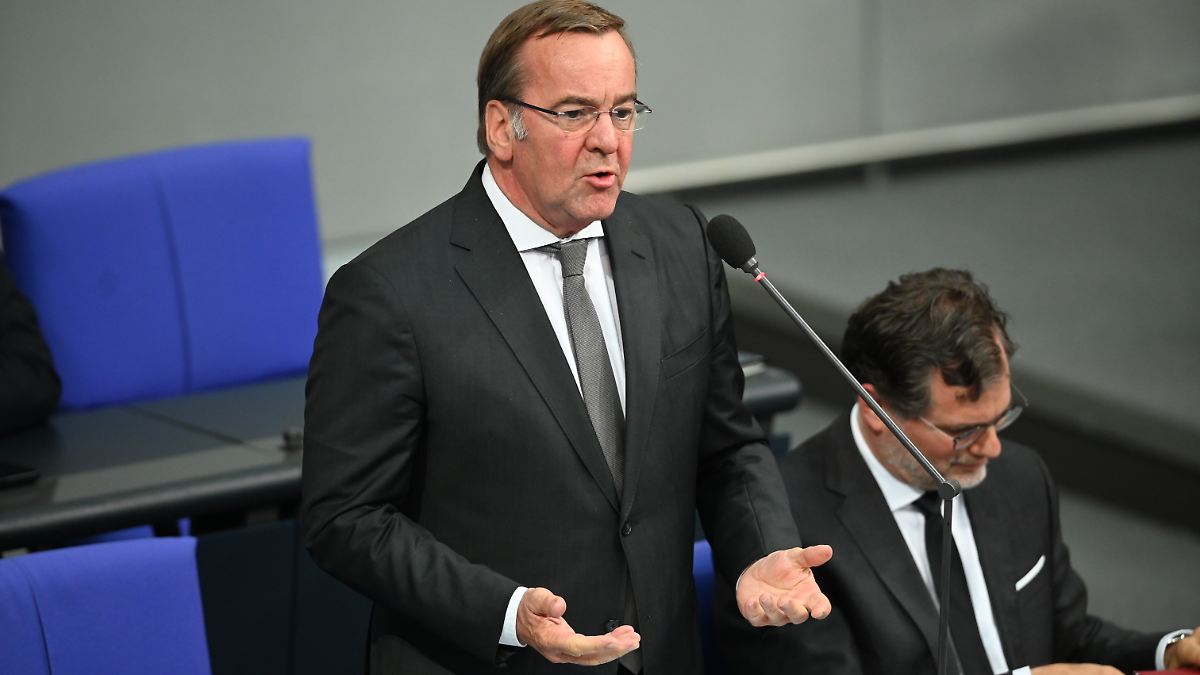Federal Defense Minister Boris Pistorius must answer questions in the Bundestag. In his introductory words, the Social Democrat made it unexpectedly clear: Germany must become “war-ready” and he also wants to introduce real compulsory military service. This puts him in conflict with his own party.
Boris Pistorius used the Bundestag questioning to make a surprisingly clear announcement. “We have to be ready for war by 2029,” said the Federal Defense Minister to MPs. “We need to provide deterrence to prevent things from coming to the worst.” SPD parliamentary group leader Rolf Mützenich firmly rejected the Social Democratic minister's choice of words in December. “Becoming war worthy or capable of war does not do justice to the complexity,” Mützenich told the “Stuttgarter Zeitung” and the “Stuttgarter Nachrichten”. The terms could “contribute to even greater uncertainty and, if in doubt, also fuel social conflicts around these difficult topics.”
Pistorius defended this formulation in the Bundestag: “It was important to me that we deal with the value of security as a society as a whole and that we take the new security policy realities seriously.” Nobody should believe “that Putin will stop at Ukraine's borders when he gets that far.”
The Defense Minister assumes a concrete threat situation. With regard to Russia's arms efforts, one must assume that Moscow “is apparently not preparing for something that has nothing to do with other countries, to put it mildly.”
Pistorius announces military service plans
In order to be ready for defense, three things are needed, said Pistorius: “personnel, material and finances.” The Bundeswehr needs enough personnel to be able to endure and grow. “I am convinced that we need a new form of military service. I will make a proposal on this soon.” Pistorius is no longer pursuing considerations about a general compulsory service for men and women. Federal Chancellor Olaf Scholz, among others, had signaled his rejection of this.
According to reports, the ministry is at least considering sending out screening questionnaires to young adults in order to get an overview of who would be available in an emergency. There should also be more incentives for using weapons. Pistorius had wanted to present the plans in May, but will now only do so after the European elections. The SPD may have wanted to keep the issue out of the election. Now Pistorius said shortly before election day that there could not be a conscription model without the potential for friction: “But I can already say that such military service cannot be free of obligations of any kind.”
Pistorius doesn't rule anything out
Pistorius is also threatened with conflicts with his own government when it comes to the budget. The federal government must “continue to invest significantly” in the Bundeswehr. The budget from the special fund will be fully planned by 2025. The funds will be withdrawn by 2027. During this period, Germany will meet NATO's goal of spending at least two percent of gross domestic product on defense. “I can rule out overexploitation of my budget.”
For the coming year, he has reported a need of “between 6.5 and 7 billion euros” to Federal Finance Minister Christian Lindner – in addition to the current budget of around 52 billion euros. Lindner – with the support of the Chancellor – had not planned to increase the budget. The federal government has to save around 30 billion euros for the coming year. In June, the budget negotiations will enter the hot phase, and the explosive power for the government coalition is enormous. Pistorius' warning about “war-readiness” and the resulting need must also be seen against the background of these negotiations.
Pistorius was also asked about a media report according to which he had already threatened the SPD parliamentary group that he would not have to do his job if the necessary money was not provided. The fact that the statement in the spring was meant in this way was subsequently widely disputed. In front of the Bundestag, Pistorius said that he would “not reveal whether such a red line even exists, because I am a declared supporter of a certain strategic ambiguity.” The term means ambiguity, with the aim of leaving the other person unclear about their own intentions. So did Pistorius leave it open before the Bundestag whether he would give up if necessary if he lacked the backing of the rest of the cabinet and especially the Chancellor? “There is no threatening scenario at all, there are budget consultations,” added Pistorius.
Pistorius finds AfD questions “stupid”
His statement was nevertheless ambiguous: in the debate about the right way to deal with Russia, Scholz is accused of not understanding the deterrent effect of strategic ambiguity. The Chancellor has repeatedly categorically ruled out certain military steps by Germany to support Ukraine. French President Emmanuel Macron, on the other hand, is even open to deploying Western troops in Ukraine. The approach: Putin should not know in advance what risks he will run in the event of further escalation.
Scholz's strategy and communication on the subject of Ukraine was also the subject of the simultaneous survey by Chancellery Minister Wolfgang Schmidt. Scholz's close confidant criticized the Chancellor's style, saying it was “strange the way in which every single weapon system in Germany is lovingly discussed.” He thinks it is better not to provide Russia with all information about deployed weapon systems “free of charge.”
Federal Defense Minister Pistorius appeared aggressive in his dealings with the AfD parliamentary group: “Sometimes you are surprised at the intellectual content of a question,” commented the Lower Saxon on a question from AfD MP Martin Reichardt. He later generally accused the AfD of asking “stupid” questions. Bundestag President Bärbel Bas urged the minister to show moderation. “Unfortunately I can’t blame the government bank,” said Bas. The person addressed nevertheless complied with the request. It is possible that Pistorius will also expect criticism from other Social Democrats after this appearance. However, according to various surveys, the most popular federal politician by far did not give the impression that he feared such things.




